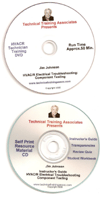All of this means there is no good reason for an HVAC contractor to dismiss or fail to support ongoing training for employees. Training is essential to maintain good customer service and to stay ahead of the competition.
Ross Mortensen, a service technician for NAC Mechanical & Electrical Services of Vadnais Heights, Minn., shared his experiences with chiller training and the important role this training — offered by the manufacturer whose equipment his company sells — plays in the everyday workplace of his employer. Mortensen has attended training from Daikin McQuay at its chiller plant in Staunton, Va.
“In today’s constantly changing field of HVAC service and design, energy conservation, environmental concerns, and keeping down costs are a driving force behind many of the decisions being made by HVAC customers,” Mortensen said. “You need to stay informed and educated to provide the best service solutions and new ideas to your customers.”
Chris Pedecine, Daikin McQuay Solutions Plaza manager said, “Newer technologies are coming onto the market — such as magnetic bearing chillers — and contractors need to make sure they have the proper training for installing and maintaining these technologies.
“In addition, we are seeing a large population of younger engineers who did not go to school for HVAC engineering. As a result, they are self-educating beyond their day-to-day jobs so they can be more comfortable and confident in their recommendations. For the more advanced HVAC engineers, many have been promoted into managerial roles so they are not as intimate in the designs as they used to be, and they are looking for refresher courses to keep up their skills when reviewing work.”
Building Confidence
Mortensen believes that his training has given him confidence to be able to answer his customers’ questions and knows that continuing education is the best way to create an atmosphere of dialogue with the customer. “When we show up to a new job site, we are expected to be the expert. The maintenance technician showing us the equipment probably has years dealing with that particular piece of equipment. He needs that chiller running — and if I can’t do it, he will call someone else. You need to ask the right questions to gain their confidence. You may know how the chiller operates but you need to know how they are operating it. Over the years buildings change. There may have been equipment added or removed from the original design.”
Mortensen gave an example of how confidence made his job easier. “In one instance, an expansion to a building added a couple air handlers,” he said. “The customer could not cool or dehumidify the building properly. A contractor gave them a bid to add another chiller to the system. When they called for a second opinion, it was found that the current chiller could handle the additional load, but the pumps were undersized. We added larger pumps and the system is operating just fine.”
Luckily for contractors like NAC Mechanical & Electrical Services, there are manufacturers who make it convenient for them to participate in continuing education in order to meet these challenges. While Daikin McQuay’s facilities in Virginia or New Jersey may not be convenient for HVAC contractors and employees to attend classes, there are also road shows available. “Eliminating barriers to training is extremely important so we like to make sure that it is easy to access and convenient,” said Pedecine. “For large groups interested in operation, repair, and maintenance classes, Daikin McQuay will come to the site and customize a training session specifically for the application. When classes sell out, we add additional space and use video streaming to accommodate as many people as possible.
“When new technologies are introduced, we also offer regional training sessions to help contractors, engineers, and architects get up to speed quickly and gain an edge over their competitors.”
The training that Mortensen took in Staunton is part of Daikin McQuay’s four tiers of training, which include technical courses for operators and service contractors on chillers, rooftop units, and self-contained units; facility solutions training for contractors, consulting engineers, architects, and owners; lunch-and-learn speaker sessions for consulting engineers; and Daikin McQuay sales representative training.
“We have seen a surge in attendance for basic system design classes,” said Pedecine. “In fact, training events are selling out within a few days, even after we add additional seats. To accommodate them, we have added video streaming into additional training rooms.”
That doesn’t come as any surprise to Mortensen. “Continued education is a must,” he said. “The larger the equipment, the higher the price tag. You need to know what the system requires to run efficiently. HVAC contractors are in the business of selling qualified service to their customers. They also need to make a profit or they will not be in business very long. An educated service tech knows what updates, modifications, and repairs will benefit the customers’ systems. If they can explain this to the customer in language he understands, then the educated tech is valued to both the customer and the contractor.”
That philosophy rubs off on a lot of HVAC contractors. “The contractors attending training are coming because they want to learn more about a particular system, if there is a business advantage about the system,” said Pedecine. “This gives them an advantage in the field and allows them to add value for their customers.”
And, according to Mortensen, it is all about the customers. “My job is to make my customer’s job easier,” he said. “If through continuing education I can improve the efficiency and reliability of their equipment, it reduces the amount of time they spend tending to HVAC duties and allows them more time for other projects. If they look more efficient to their supervisors, you become a valuable part of their team.”
Publication date: 5/7/2012










